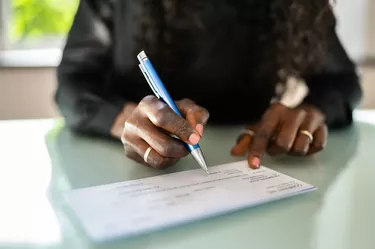
Third-party checks are personal checks written to one person (the payee) but signed over to another to deposit or cash, explains AccuChex. Because checks are becoming less common, many people who receive checks (the original payee) might want to use them to pay others rather than cash them or deposit them in their own bank account or credit union. Understanding how to accept or sign over a third-party check will help you complete the transaction correctly and ensure there are no problems later.
2-Party Check Transactions
Video of the Day
Most personal check transactions are simple. Someone owes you money and writes you a check. You deposit the check or cash the check and get the money for it right then. You can pay someone using a paper check or use an eCheck if you have your checking account set up to do so or if you're using a website or phone app that uses eChecks.
Video of the Day
Checks used to be an essential part of personal finance, and payees would need to go to their financial institution to deal with various types of checks, from personal checks to money orders to cashier's checks. Now, though, you don't need a financial institution that is brick-and-mortar or a check cashing service to deal with a payment from a family member. Instead, online banking and mobile deposit allows you to cash third-party checks or checks where you are the original payee right from home.
3rd-Party Checks
What's the difference between a two-party check and a third-party check? Let's say Bob Smith owes Maria Gonzalez $100. He can pay her with a $100 endorsed check tied to his checking account, creating a two-party check transaction.
In another scenario, Bob runs into Maria, who says, "Hey Bob, do you have the $100 you owe me?" Bob forgot that Maria had been a lender when he needed cash for his rent last month, and he only has $60 in cash on him. He has been trying to work on his budgeting. Fortunately, he has a $40 check that Hank Jones has given him. Bob says, "Maria, I only have $60 in cash, but I can sign a $40 check over to you that Hank wrote to me." Maria agrees and Bob endorses the check to himself, as he is the original payee. Then, he makes it payable to Maria. This creates a third-party check. Maria takes the $60 in cash and the $40 third-party check, which she endorses to herself and deposits or cashes.
A financial institution may require you to have a photo ID when you try to cash or deposit a check like this. You also will likely need to write your account number on the back of the check.
Some banks will cash checks to their account holders and not to third parties. You may be able to find information about how your financial institution would handle this situation on the FAQs page of its website. A national bank like Bank of America may handle this differently than a small or local bank, banks in grocery stores or a credit union.
Endorsing 3rd-Party Checks
In order to create a third-party check, the person to whom the check is written must first endorse it. This means signing their name on the back of the check in the correct area (usually identified with a signature line). Under the endorsement, the person writes, "Pay to" or "Pay to the order of" and writes the name of the person who now gets the check. That person then endorses the check by signing their name on it.
In the scenario above, Bob has a check made payable to "Bob Smith" that was given to him by Hank Jones. Bob turns the check over and signs his name on it. Under that, he writes, "Pay to Maria Gonzalez." Maria signs her name underneath. She can then cash it or deposit it.
You can use this process when you receive checks from a business or want to pay a business using a third-party check. You can also create fourth-party (or more extended) checks. This was a common occurrence during friendly poker games where the same check kept getting passed around as players used it as payment. Most banks limit the number of parties who can endorse a check. Check the bank's FAQs for more information about third-party check cashing into your savings account or checking account.
Problems With 3rd-Party Checks
Some people are hesitant to accept third-party checks, especially if they don't know the person who wrote the original check (which might bounce). What if Hank's check bounces? Will Bob honor the bad check fee Maria gets charged? Will Hank reimburse Bob for the fee?
Some banks and other businesses refuse to take third-party checks, explains Huntington National Bank. You might also have to wait longer for your money because your bank needs to verify the transaction with an extra step. In some cases, you can't deposit a third-party check electronically, or you might not be able to cash a third-party check and only be able to deposit it.